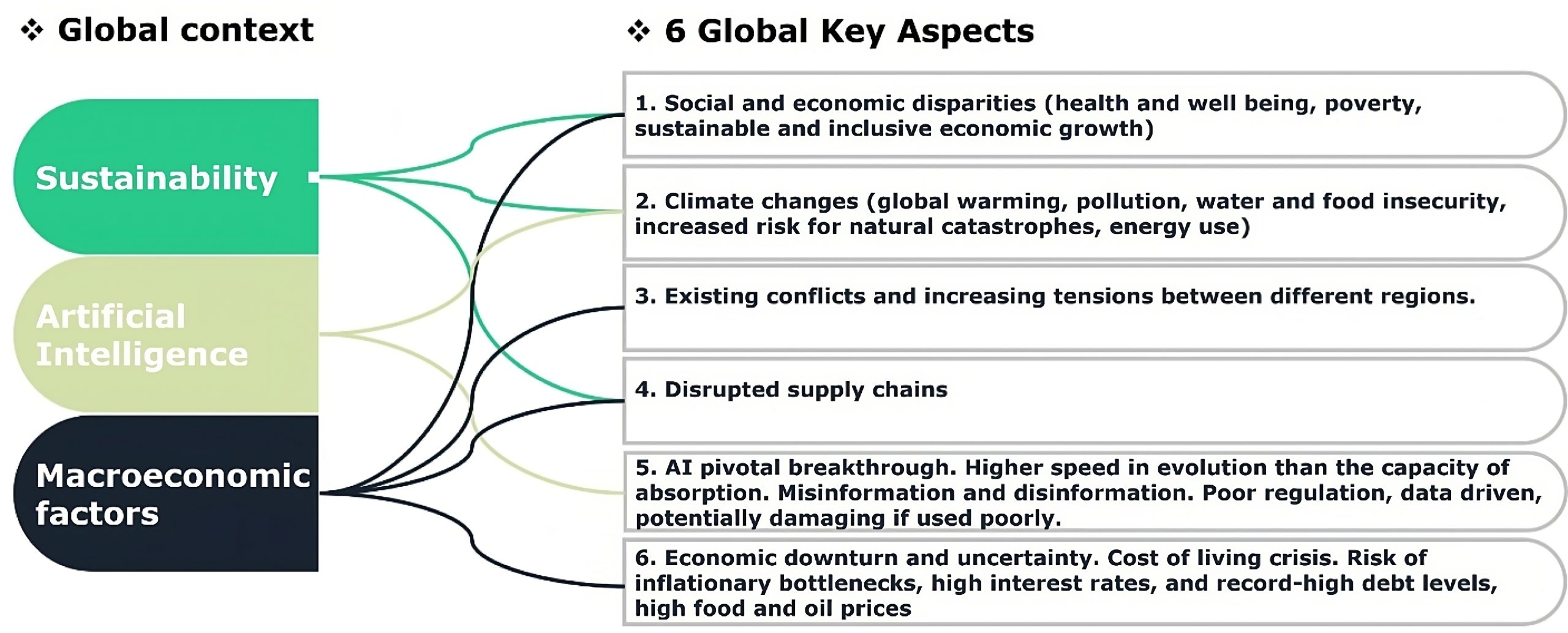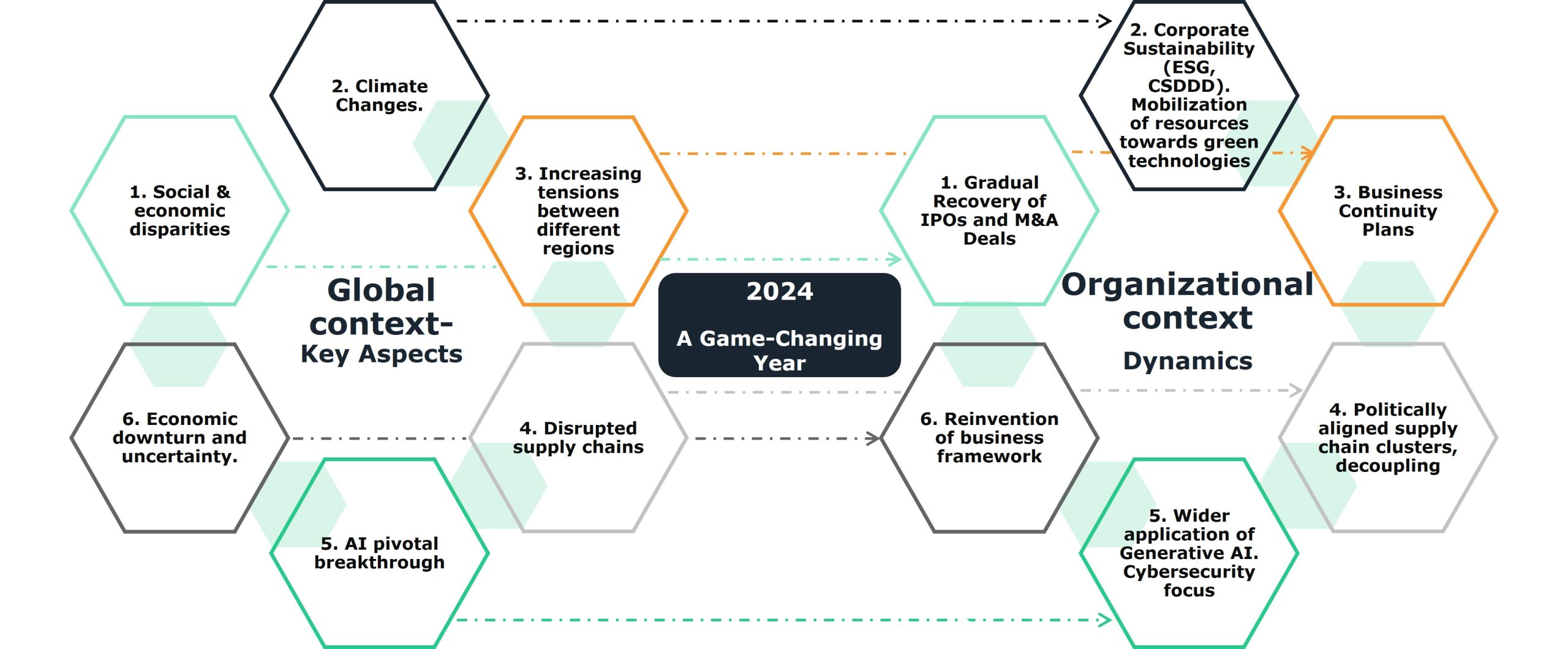Today, global organizations need to address a very complex and dynamic business environment, which requires constant zoom in zoom out analysis, regular adjustments, and very high costs to keep pace with all new emerging technologies. To continue working in silos requires a tremendous effort and it makes less sense when you think so many aspects around sustainability, artificial intelligence, macroeconomic factors are of global interest and with same global impact. They have been and continue to be scrutinized by many top leaders around the world, and they impact all global organizations in quite similar ways.
Along internal challenges detailed in the article ‘Today’s GBS Challenges’, the shared services/ global business services industry plays a decisive role in supporting global organizations successfully navigate this very complex global landscape. Deriving from sustainability, artificial intelligence, and macroeconomic factors, a thorough evaluation and immediate analysis of 6 key aspects are required: (Fig. 1).
- Social and economic disparities (health and wellbeing, poverty, sustainable and inclusive economic growth desiderate)
- Climate changes (global warming, pollution, water and food insecurity, increased risk for natural catastrophes, energy use)
- Regional conflicts (increasing tensions in Middle East, Ukraine-Russia conflict, China- SUA etc)
- Disrupted supply chains (as a result of climate changes, COVID or regional tensions)
- AI breakthroughs (showing a higher speed in evolution than the capacity of absorption, poorly regulated, potentially damaging if poorly used, data dependency. Strong need to carefully underpin misinformation and disinformation and mitigate cybersecurity risks). Experts advise it can be used to further address sustainability issues, but it has significant consequences related to energy consumption, so it becomes quite a challenge to find the right balance.
- Economic downturn, and uncertainty (cost of living crisis, risks of inflationary bottlenecks, high interest rates, record-high debt levels, high food and oil prices)
Fig.1:

Understanding this context and setting up a strategy that correlates all these six aspects is key and can be decisive in obtaining a huge competitive advantage, when applied diligently. This complex context manifests within organizational dynamics, influencing decision-making and resource allocation and creating a need to approach game changing solutions.
Below graphical visualization serves to understanding this correlation, while recognizing the likelihood of further complex interdependencies:
Fig.2:

- Social & economic disparities– Such dynamics are likely to result in an increase in mergers and acquisitions and a necessity for existing organizations to consolidate their market position. This comes with huge integration efforts to be accounted for.
- Climate changes and everything correlated to people and planet impact is already materialized in global corporate sustainability directives: ESG, CSDDD, CSRD, managed currently by each organization in their own capacity.
- Increasing tensions between different regions raises a need for organizations to mandatorily elaborate consistent Business Continuity Plans, which imply rigor and high efforts for constant reviews.
- Disrupted supply chains caused by regional conflicts, COVID or climate changes impose a reconfiguration of global supply chain operations, most experts being in favor of decoupling strategy over a linear approach. Better supply chain management is required for increased negotiations capabilities, faster response to market demands and greater resilience.
- AI breakthroughs. There’s no disputing that AI will continue to play an integral role in both our current and future daily lives. The essential inquiries revolve around its ethical deployment, the necessity for stringent regulations, and prioritizing security measures. Yet, the imperative for organizations to adopt AI to stay competitive cannot be denied.
- Economic downturn and uncertainty. The prevailing economic challenges at a macro level, from cost-of-living crises, high interest rates or high debt levels serve as a call to rethinking business frameworks. It’s imperative not to shy away from scrutinizing what isn’t functioning optimally today and instead strive for enhanced, more purposeful, and transparent business practices. Achieving this necessitates collaboration and involves significant implications for change management.
In a unified global business services framework, topics like structure, scalability, best practices, centralized expertise in corporate sustainability, Business Continuity Plans, data use for AI purpose, supplier negotiation, shared talent, are taken to the next level generating a tremendously competitive advantage in terms of cost, agility, efficiency, and AI readiness.
The shared services/ global business services industry is in a very good position to drive this change in approach, to avoid endless redundancies from working in silos and allow global organizations to focus on their core business instead.
In essence, navigating the intricate landscape of global organizational dynamics in 2024 calls for holistic strategies that integrate these key aspects, fostering resilience for those organizations whose leaders possess the courage and presence to confront these challenges. Those will be the ones ahead.
KINETPRISE powered by COZIA is an optimal business framework created to address these challenges.
Curious to learn more about COZIA’s proposed structure? Reach out to us via the contact form on our website or send a private message on LinkedIn.
Cristina Volovei
CEO & Founder COZIA Solutions
